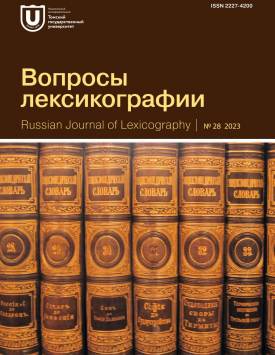Problems of lexicographic representation of parenthetical words
The article analyzes the features of the lexicographic representation of words and phrases that are traditionally classified as parenthetical. The appeal to this topic is due to the fact that it is often dictionaries that are the sources on which the writer relies when deciding whether to separate this or that word or combination with commas. Based on a continuous analysis of specialized dictionaries on the difficulties of Russian punctuation, four groups of units were distinguished in relation to the property of parentheticalness: (1) always parenthetical (616 units); (2) always non-parenthetical, “pseudoparenthetical” (162 units); (3) words whose functions are clearly distinguished in the context (103 units); (4) “unstable parenthetical”, parenthetical in case of a special decision of the author (228 units). The material of the study was a corpus of dictionary entries that describe or mention these units. We were interested in how the meaning of this or that unit is formulated, what grammatical marks it is accompanied by, and what examples are given as an illustration of its use. Two specialized punctuation dictionaries, two academic and two one-volume explanatory dictionaries of the Russian language were taken for analysis. Assuming that discrepancies in the characteristics of individual units are inevitable in dictionaries, we proceeded from the hypothesis that these discrepancies would concern only “unstable parenthetical” units. However, a continuous analysis of dictionary entries showed that the “lexicographic portrayal” of units of all other groups also differs from dictionary to dictionary. In addition, in some cases the representation of a word in dictionaries differs from its representation in reference books on Russian punctuation. We have identified the following ways of dictionary representation of the above groups of words: (1) marks that unambiguously indicate the grammatical status of the unit (“parenthetical word”, “particle”, “adverb”, “conjunction”); (2) marks “in the meaning of a parenthetical unit”, “in the meaning of the conjunction”, etc.; (3) examples from literary texts illustrating the functioning of these units; (4) expressions like: “used for ...”, “used in the function of .”; (5) selection of synonyms. The grammatical characteristics of words expressing the subjective attitude of the speaker or shaping his thoughts are not uniform. In academic explanatory and specialized dictionaries, a word, as a rule, receives the grammatical status of a particle/adverb/conjunction and is considered in a special parenthetical function. In one-volume explanatory dictionaries, the “parenthetical word” is already more of a part-of-speech characteristic. With regard to many words, the dynamics of “parenthetical - non-parenthetical”, “nonparenthetical - parenthetical” can be traced very clearly when analyzing explanatory dictionaries of different years. At the end of the article, some of our thoughts are given on how parenthetical, unstable parenthetical and “pseudo-parenthetical” words should be presented in dictionaries. The authors declare no conflicts of interests.
Keywords
parenthetical words, explanatory dictionary, union, particle, punctuation, modal words, linking wordsAuthors
| Name | Organization | |
| Kuznetsova Natalya V. | University of Tyumen | nvkouznets@gmail.com |
| Pochtareva Olga V. | University of Tyumen | olga2476@mail.ru |
References

Problems of lexicographic representation of parenthetical words | Voprosy leksikografii – Russian Journal of Lexicography. 2023. № 28. DOI: 10.17223/22274200/28/4
